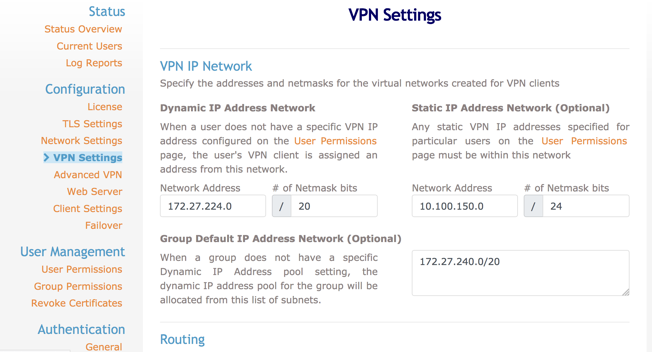

Get it here (the Windows installer): Īfter you install it, transfer the archive to your PC and unpack it to your OpenVPN GUI’s config folder (usually in “C:\Program Files(x86)\OpenVPN\config\”) Now you need to install OpenVPN on your PC. Save the file and activate the changes: sysctl -p /etc/nfĪlso enable masquerading in firewall iptables -t nat -A POSTROUTING -s 10.8.0.0/24 -o eth0 -j MASQUERADE

Traffic forwarding has to be enabled for the VPN connection to work.Įdit /etc/nf and enable ipv4 forwarding by un-commenting the line “_forward=0” removing the # sign and changing 0 to 1 so it looks like this: _forward=1 You should see something like this 6646 ? Ss 0:00 /usr/sbin/openvpn -writepid /var/run/ -daemon ovpn-server -cd /etc/openvpn -config /etc/openvpn/nf tar.gz archive, e.g. Ĭheck if your OpenVPN server is running: ps ax|grep openvpn If everything went smoothly, the auto-installer will notify you that the client certificates are available in a. It is using 2048 RSA keys for authentication and Blowfish 128 bit for data encryption. This is all, now the auto OpenVPN installer will download the packages, generate the encryption keys and certificates and start the server. You will be asked for a name of client certificate. This is useful for stealthier connectionsĤ. Choose whether to listen on port 53, too.

You can use any port, such as a random one, as long as it is not in-use by other service.ģ. Insert the port number used for incoming OpenVPN connections or use the default (1194). Change it only if you have multiple IP addresses on the server and you want to use a specific one.Ģ. It will autodetect your public IP address. The auto installer will start and will prompt you for some informationġ. Login to your Debian/Ubuntu VPS and run the following: wget -no-check-certificate -O openvpn-install.sh chmod +x openvpn-install.sh Here is a guide to install OpenVPN on your own VPS server running Debian or Ubuntu Linux.įirst you need to download an auto-installer for OpenVPN, such as Nyr’s openvpn-install

But what if you want to run your own OpenVPN server? How hard is it to install and manage the server yourself? Not that hard: automated scripts come to the rescue! OpenVPN is arguably the most common VPN protocol used by commercial VPN providers today.


 0 kommentar(er)
0 kommentar(er)
